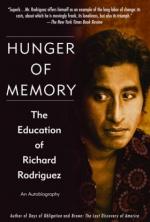
|
| Name: _________________________ | Period: ___________________ |
This test consists of 15 multiple choice questions and 5 short answer questions.
Multiple Choice Questions
1. What does his mother think about his reading?
(a) She wishes he would read less and go play sports.
(b) She is proud of him for reading so much.
(c) She does not understand it.
(d) She hopes that he can teach her to read better.
2. Rodriguez describes events that happened how many years ago?
(a) 10 years.
(b) 5 years.
(c) 20 years.
(d) 30 years.
3. Where does Rodriguez believe Spanish should be spoken?
(a) In the classroom.
(b) Everywhere.
(c) In private, with family or close friends.
(d) In public.
4. Why do Rodriguez's teachers visit his house?
(a) To meet his parents.
(b) To ask the family to practice speaking English.
(c) To talk about his bad behavior.
(d) To ask his parents to volunteer at the school.
5. How well can Rodriguez speak English when he starts school?
(a) He does not speak English at all.
(b) He speaks English pretty well.
(c) His English is very limited.
(d) He is fluent in English and Spanish.
6. What does Rodriguez call the English-speaking people his family interacts with?
(a) Otros.
(b) Gringos.
(c) Foreigners.
(d) Non-Mexicans.
7. How does Rodriguez's grandmother affect his ideas on language?
(a) Translating her stories helps him realize that intimacy is not connected to one language.
(b) Her stubborn refusal to speak English shows him how people cling to old ideas.
(c) Translating her stories shows him how things get lost in translation.
(d) She tells him Spanish is the best language.
8. What is Rodriguez told when he asks questions about the church?
(a) Only ask questions of the priests and nuns.
(b) Do not ask questions; just memorize the right answers.
(c) Asking questions is a good thing to do.
(d) God will answer all your questions.
9. In The Achievement of Desire, Prologue, Rodriguez says that now that he is successful, people always ask him a certain question. What is it?
(a) Can I have your autograph?
(b) Are your brothers and sisters as smart as you are?
(c) Did you benefit from affirmative action?
(d) How did you manage your success?
10. What does Rodriguez say is the real reason for his success?
(a) Kissing up to the teacher.
(b) Reading every book he could find.
(c) Working very hard.
(d) Remembering what his life was like before he was educated.
11. As Rodriguez and his siblings learn more English, what happens to their family?
(a) The family loses some of its closeness.
(b) The parents depend on the children to do the talking in public.
(c) The family grows closer together.
(d) The children start disobeying their parents.
12. How does Rodriguez describe himself now?
(a) A famous author.
(b) A Latino activist.
(c) A middle-class American.
(d) An education expert.
13. What did Rodriguez learn about other religions beside his own?
(a) They are "wrong" and his religion is "right."
(b) Everybody needs to choose their own religion.
(c) There are lots of good religions in the world.
(d) Other religions are similar to his own religion.
14. How does Rodriguez get involved in his church?
(a) He reads the Bible aloud in church.
(b) He becomes an altar boy.
(c) He goes to mass every week.
(d) He studies to become a priest.
15. How is the "scholarship boy" described?
(a) A good son but a troubled student.
(b) A good student who is guaranteed to succeed.
(c) A good student but a troubled son.
(d) A good son who wants to please his parents.
Short Answer Questions
1. How does Rodriguez feel about learning English?
2. What does religion do for his parents?
3. What does Rodriguez say would be the disadvantage of bilingual education?
4. Did Rodriguez's brother and sister tell him what to expect at school?
5. How does Rodriguez explain his success to people?
|
This section contains 737 words (approx. 3 pages at 300 words per page) |

|




